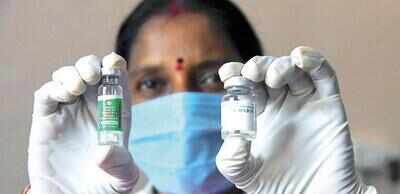- News
- City News
- lucknow News
- ‘Chance mixing of vaccines in UP may turn beneficial’
‘Chance mixing of vaccines in UP may turn beneficial’

Picture used for representational purpose only
LUCKNOW: The accidental mingling of Covid-19 vaccines in Siddharthnagar district of UP is now shaping the country’s policy on vaccine cocktail.
In May 2021, as many as 18 residents of Audhai Kalan village were given Covishield at Badhni Primary Health Centre in the first week of April, but on May 14 they were administered Covaxin as second dose against the guidelines.
Later, 16 of these beneficiaries were included in an Indian Council of Medical Research project called ‘Serendipitous Covid-19 Vaccine-Mix in Uttar Pradesh, India: Safety and Immunogenicity Assessment of a Heterologous Regime’.
Preliminary findings of the study have been shared on medRxiv, a free online archive and distribution server, and are up for peer review. The study indicates that immunization with a combination was not only safe but also elicited better immunogenicity.
The study included 40 persons divided into three categories. While the accidental recipients were placed in the heterogeneous group (Covishield+Covaxin), the other two were homogeneous groups (Covishield+Covishield and Covaxin+Covaxin).
The groups were watched and evaluated after nine weeks for immunogenicity — immunity against the virus — and reactogenicity, a term used to describe side effects after vaccine administration.
ICMR’s work was coordinated by its Regional Medical Research Centre in Gorakhpur. Its director Dr Rajni Kant said: “Overall, this study demonstrates that immunization with a heterologous combination of Covishield and Covaxin is safe and elicits better immunogenicity than two doses of homologous vaccination using the same vaccine.”
“It was also noted that immunity against different strains Alpha, Beta and Delta variants was superior in the heterologous group. However, a multicentre randomised control trial needs to be done to conclusively prove these findings,” he added.
These findings have important implications for Covid-19 vaccination as heterologous immunisation can induce better protection against SARS-CoV-2 variant strains, Dr Kant said.
“Mixed regimens will also help to overcome the challenges of the shortfall of vaccines in India where a huge population has to be vaccinated,” he added.
Experts, however, are of the view that it is too early to celebrate the findings. “The primary findings are yet to be reviewed, and the patients will be evaluated several times before final conclusions can be drawn. However, they are surely promising,” said a senior researcher at ICMR.
In May 2021, as many as 18 residents of Audhai Kalan village were given Covishield at Badhni Primary Health Centre in the first week of April, but on May 14 they were administered Covaxin as second dose against the guidelines.
Later, 16 of these beneficiaries were included in an Indian Council of Medical Research project called ‘Serendipitous Covid-19 Vaccine-Mix in Uttar Pradesh, India: Safety and Immunogenicity Assessment of a Heterologous Regime’.
Preliminary findings of the study have been shared on medRxiv, a free online archive and distribution server, and are up for peer review. The study indicates that immunization with a combination was not only safe but also elicited better immunogenicity.
The study included 40 persons divided into three categories. While the accidental recipients were placed in the heterogeneous group (Covishield+Covaxin), the other two were homogeneous groups (Covishield+Covishield and Covaxin+Covaxin).
The groups were watched and evaluated after nine weeks for immunogenicity — immunity against the virus — and reactogenicity, a term used to describe side effects after vaccine administration.
ICMR’s work was coordinated by its Regional Medical Research Centre in Gorakhpur. Its director Dr Rajni Kant said: “Overall, this study demonstrates that immunization with a heterologous combination of Covishield and Covaxin is safe and elicits better immunogenicity than two doses of homologous vaccination using the same vaccine.”
“It was also noted that immunity against different strains Alpha, Beta and Delta variants was superior in the heterologous group. However, a multicentre randomised control trial needs to be done to conclusively prove these findings,” he added.
These findings have important implications for Covid-19 vaccination as heterologous immunisation can induce better protection against SARS-CoV-2 variant strains, Dr Kant said.
“Mixed regimens will also help to overcome the challenges of the shortfall of vaccines in India where a huge population has to be vaccinated,” he added.
Experts, however, are of the view that it is too early to celebrate the findings. “The primary findings are yet to be reviewed, and the patients will be evaluated several times before final conclusions can be drawn. However, they are surely promising,” said a senior researcher at ICMR.
FacebookTwitterLinkedinEMail
Start a Conversation
end of article
Quick Links
Delhi Air PollutionDelhi TemperatureChennai WeatherBangalore TemperatureCovid vaccination centres in DelhiCoronavirus in DelhiRTPCR test in GurgaonHyderabad RainPollution level in BangaloreDelhi SmogDelhi TemperatureNoida AQIGurgaon AQI todayFire in MumbaiMumbai RainsCovid 19 RT PCR Test in NoidaDelhi AQI todaySrinagar encounter

